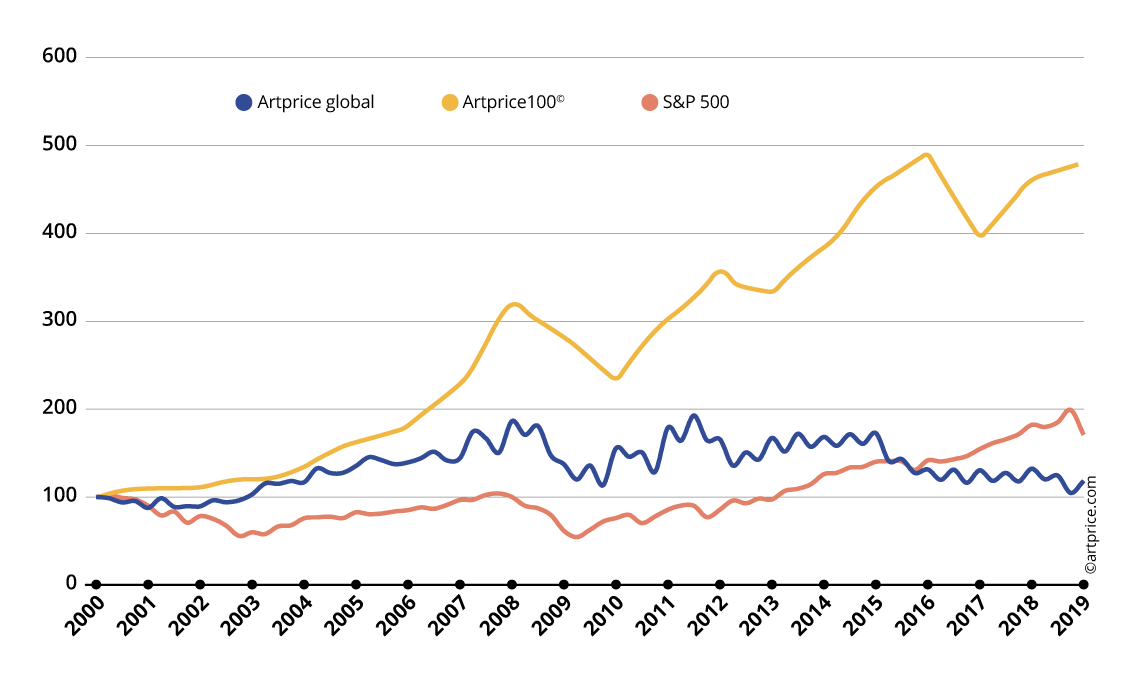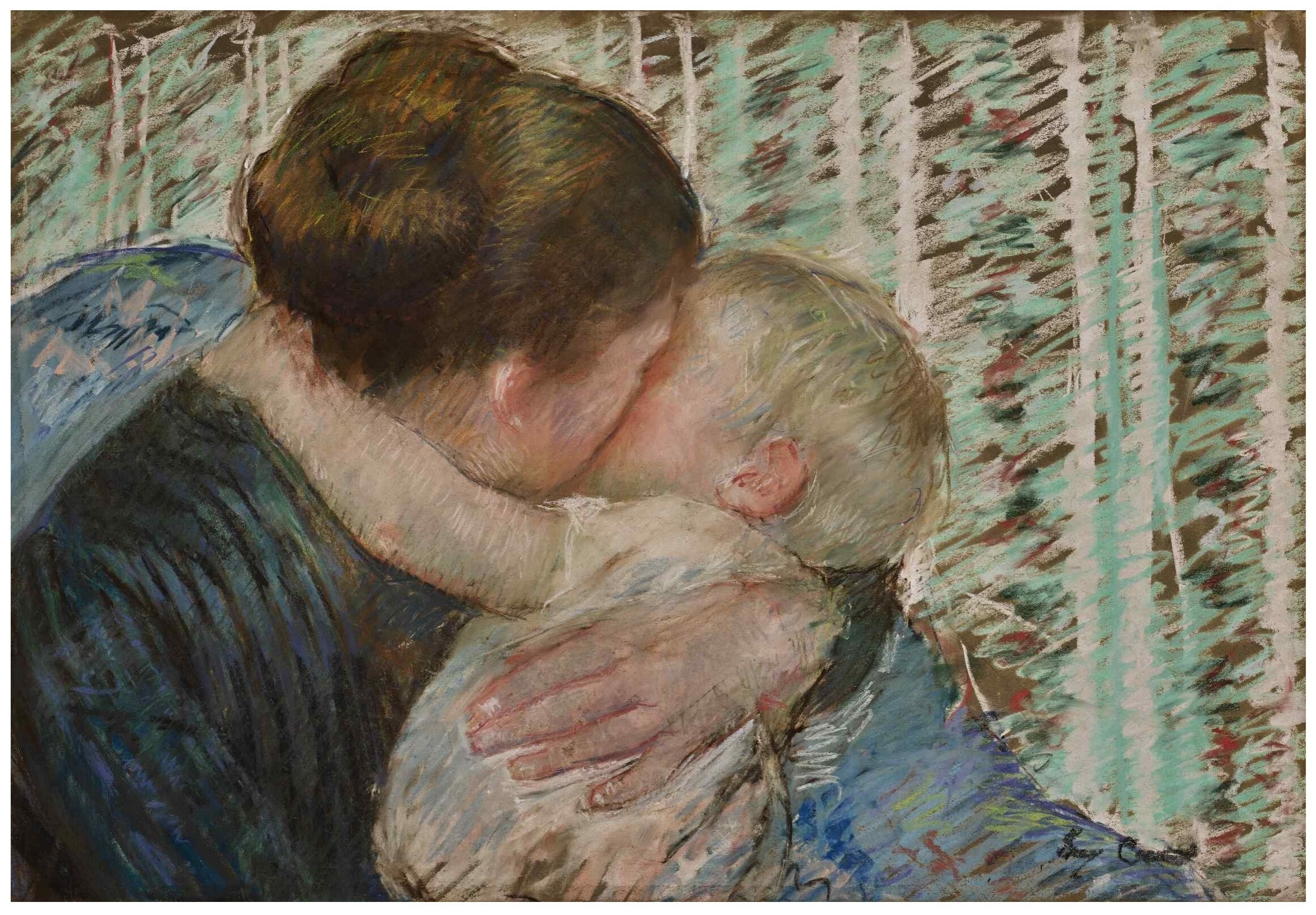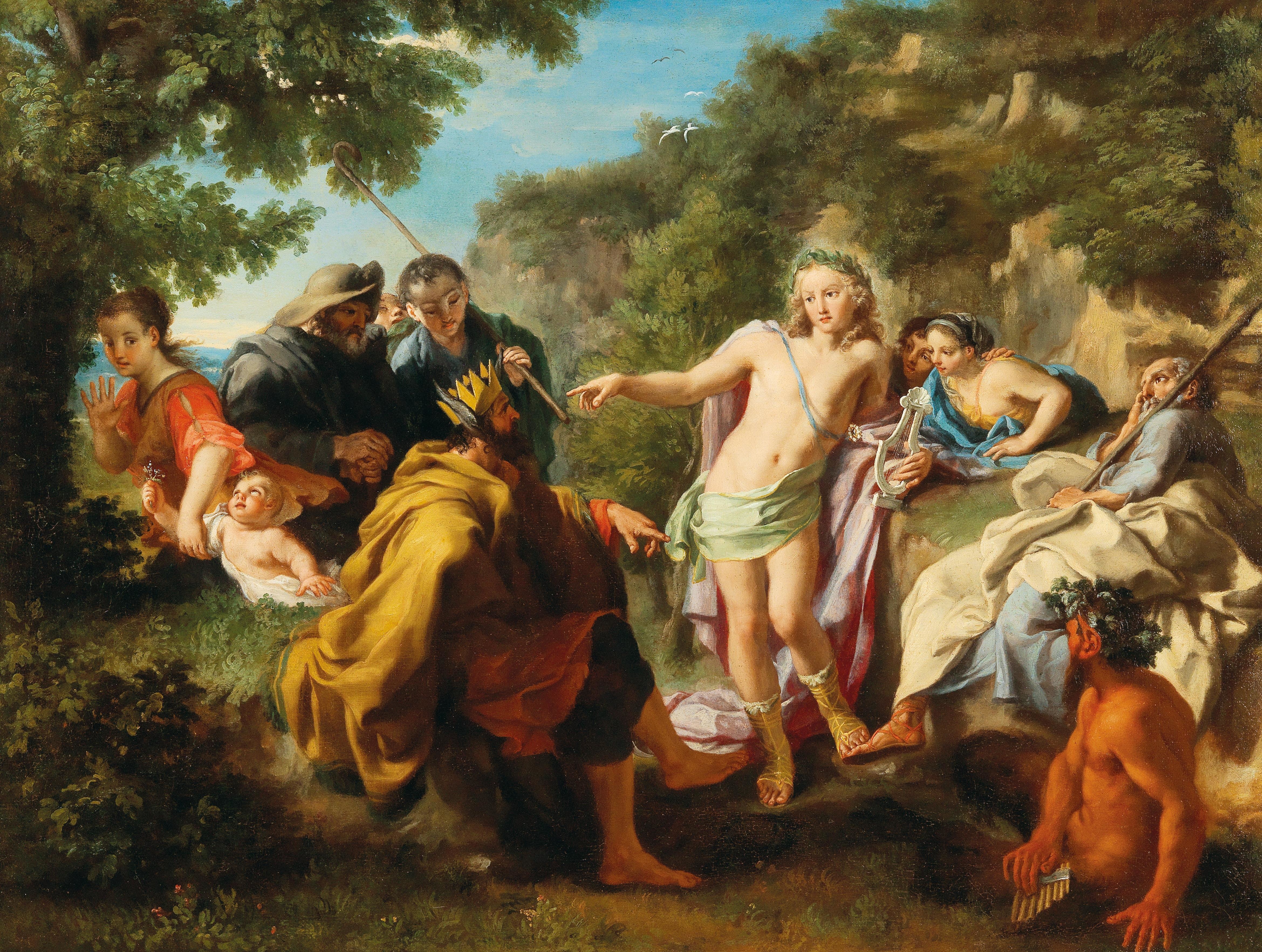Investing in Art
In an era of negative interest rates, Art is more than ever a serious alternative to traditional investments. From a financial point of view, Art shares many characteristics with real estate: almost perfect property heterogeneity, high transaction costs, low liquidity, slow price evolution (+18% since 2000). Yet simple investment strategies have demonstrated that Art can generate competitive returns over the medium and long term.
General performances
Inspired by benchmark stock indexes, the Artprice100© traces the value of a standard portfolio composed of the top 100 artists on the secondary market. Its composition is adjusted once a year, on 1 January, in order to invest in the 100 best performing artists over the last five years and who also satisfy a strict liquidity criterion: at least ten ‘homogeneous’ works (i.e. of the same type from one year to the next) sold annually. Each artist is weighted proportionally to his auction turnover over the period concerned.
Artprice’s Art Market Price Index vs. S&P 500

The performance of the Artprice100© confirms that a simple investment strategy can offer significantly higher returns than the Art Market as a whole, but also outperform financial market returns. The Artprice100© is an example of a portfolio that is both coherent and well diversified, whose only flaw is its greater correlation with the S&P 500 than with Artprice’s overall art price index.
Repeat sales methodology
The price evolutions of a sample of 5,660 lots, sold in 2018 and for which a previous acquisition at auction could be clearly identified, shows that the average annual return of artworks in circulation now stands at +7%, for an average holding period of 11 years.
A segmentation by price range shows that the returns vary significantly according to the size of the initial investment: the higher the purchase price, the higher the profitability, up to a certain threshold at least. Above $1 million, the price volatility declines and returns tend to flatten out slightly.
Return on artworks bought at auction and resold in 2018
| Purchase price | ROI | Holding period |
|---|---|---|
| $10,000 – $50,000 | 6.2% | 12.5 |
| $50,000 – $200,000 | 7.0% | 11.5 |
| $200,000 – $1 million | 8.2% | 10.5 |
| > $1 million | 7.6% | 9.6 |
| © Artprice.com | ||
The sample also reveals that long-term holding periods (over 15 years) generate the best capital gains, as they tend to take full advantage of an artist’s price construction. The best financial transactions recorded in 2018 highlight works acquired relatively early in the career of artists who have now become icons of Post-War or Contemporary Art.
Top 10 price appreciations in 2018 (selection)
| Auction #1 | Auction #2 | |||||
|---|---|---|---|---|---|---|
| Artist | Artwork | Price | Auction | Price | Auction | |
| 1 | LIN Richard | Feb 63 – 65 Painting Relief | $1,096 | 28 Jun 1991 Christie’s London | $208,948 | 01/10/2018 Sotheby’s Hong Kong |
| 2 | SAN Yu | Femme aux bras levés (c.1920-30) | $1,204 | 11 Dec 2000 Piasa Paris | $170,025 | 24 Mar 2018 Sotheby’s Paris |
| 3 | Jean-Michel BASQUIAT | Red Rabbit (1982) | $63,525 | 4 May 1993 Sotheby’s New York | $6,612,500 | 17 May 2018 Christie’s New York |
| 4 | Keith HARING | Sister Cities – For Tokyo (1985) | $46,000 | 13 Nov 1998 Christie’s New York | $4,455,000 | 14 Nov 2018 Sotheby’s New York |
| 5 | Frantisek FOLTYN | Composition (1927) | $4,047 | 16 Apr 1992 Briest Paris | $356,176 | 13 Nov 2018 Sotheby’s London |
| 6 | Vasilij SUCHAEV | Russian landscape (1922) | $6,667 | 29 Apr 1999 Sotheby’s London | $559,419 | 5 Jun 2018 Sotheby’s London |
| 7 | Andy WARHOL | Last Supper (1986) | $116,430 | 29 Jun 1988 Phillips London | $8,752,500 | 17 May 2018 Phillips New York |
| 8 | Bridget RILEY | Close By (1992) | $30,378 | 12 Dec 1997 Christie’s London | $2,275,195 | 4 Oct 2018 Christie’s London |
| 9 | Kay SAGE | Festa (1947) | $6,050 | 25 Apr 1986 Sotheby’s New York | $444,500 | 12 Nov 2018 Christie’s New York |
| 10 | Yayoi KUSAMA | Pumpkin (1990) | $16,800 | 15 Mar 2006 Sotheby’s New York | $999,000 | 15 Nov 2018 Sotheby’s New York |
| © Artprice.com | ||||||
The minimalist painter LIN Richard, who died in 2011, generated the year’s best capital gain after his painting Feb 63-65 Painting relief sold for 190 times its acquisition price 27 years earlier. This transaction produced an average annual return on investment of 32% over more than a quarter of a century.
Equally impressive was the price fetched by SAN Yu’s drawing Femme aux bras levés that multiplied its previous acquisition price in 2000 at Drouot in Paris by 140 times. The exceptional value accretion of this work, several decades after the artist’s death, is clearly linked to the recent market successes of 20th century Franco-Chinese painters (Zao Wou-Ki, Chu Teh-Chun, etc.). Whereas a dozen works on paper by San Yu were auctioned annually in the early 2000s, Artprice now lists more than 100 transactions each year, with an extremely low unsold rate (6% in 2018).
Female artists catching up
Among the most important transformations of the Art Market, the new recognition being granted to women artists offers tremendous investment opportunities. In light of the latest results, certain works by Bridget RILEY have been as successful as those of Jean-Michel Basquiat, Andy Warhol or Keith Haring over the past 20 years. Purchased tens of thousands of dollars in the 1990s, her paintings are now worth several million each.
Another Brit, Cecily BROWN, is experiencing an equally rapid revaluation. Her painting Suddenly Last Summer (1999), initially sold by Larry Gagosian in New York in 2000, went to auction for the first time in May 2009 at Phillips where it fetched $662,500. Twelve months later, it was offered again (at Sotheby’s) where it fetched just over $1 million. On 16 May 2018, Suddenly Last Summer set a new record for Cecily Brown, at Sotheby’s in New York, at $6,776,200.
This new recognition is also working for 19th century artists like Mary Cassatt, a close friend of Berthe Morisot and about whom Degas said “I cannot stand that a woman draws so well.” Over the long term, the price evolution of Mary Cassatt’s works has been sensational: acquired in 1984 for $242,000, A Goodnight Hug (1880) was resold this year at Sotheby’s for $4,518,200, an annual return on investment of 9% over 34 years.

Mary Cassatt (1844-1926)
A Goodnight Hug(1880)
Towards a more stable market
Curiously, the Old Masters market also offers short-term capital gain opportunities. Works sometimes lack visibility in ‘ordinary’ sales and can therefore be acquired well below their market value. Every year, examples of acquisitions followed by fast resales (within the year) illustrate a clear form of financial arbitrage. These strategies allow certain collector/investors to realize significant capital gains quickly, generally by including a work in a more prestigious sale.
Top 5 resales in 2018 (selection)
| Auction #1 | Auction #2 | |||||
|---|---|---|---|---|---|---|
| Artist | Artwork | Price | Auction | Price | Auction | |
| 1 | Pietro BIANCHI (1694-1740) | The Judgement of Midas | $14,458 | 23/03/2018 Koller Zurich | $56,444 | 23/10/2018 Dorotheum Vienna |
| 2 | Giovanni ODAZZI (1663-1731) | The Temptation of Saint Anthony | $10,411 | 07/03/2018 Wolley & Wallis Salisbury | $37,629 | 23/10/2018 Dorotheum Vienna |
| 3 | A.R. PENCK (1939-2017) | Kopf oder Adler (2002) | $6,223 | 17/02/2018 Galleria Pananti Florence | $22,303 | 05/12/2018 Phillips London |
| 4 | Olivier DEBRÉ (1920-1999) | Untitled (1958) | $1,594 | 20/06/2018 Beaussant- Lefevre Paris | $5,690 | 06/12/2018 Sotheby’s Paris |
| 5 | Sofu TESHIGAHARA (1900-1979) | Tableau graphisme (1971) | $2,655 | 16/05/2018 Expertisez.com Paris | $8,783 | 01/10/2018 Sotheby’s Hong Kong |
| © Artprice.com | ||||||
Several market monitoring services exist nowadays allowing collectors and professionals to be informed in real time of artworks put up for sale. Artprice’s decision support tools, developed to analyse the price construction and market structure of each artist, are increasingly helping to stabilise the Art Market and make it more efficient.

Pietro Bianchi (1694-1740)
The Judgement of Midas






 40.3
40.3
